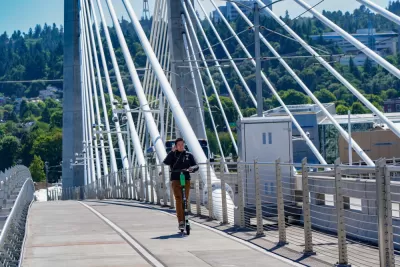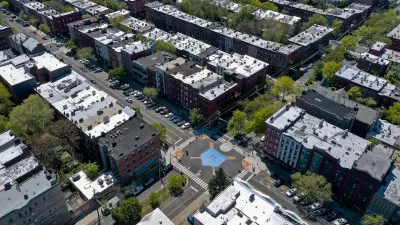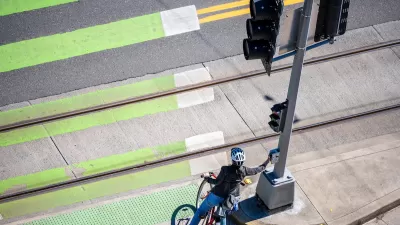E-scooters are governed by hundreds of regulations aimed at improving the safety of riders and pedestrians. Is it time to apply them to cars, too?

[Updated September 2, 2021] Streetsblog's Kea Wilson questions why, while cities have scrambled to create "hundreds of policies to minimize the downside risks of the micromobility revolution, like scofflaw riders who strike pedestrians at intersections and scooter-cluttered sidewalks rendered impassable to people who use assistive devices," no new laws have been aimed at drivers–those who cause 80 percent of fatal scooter crashes and close to 40,000 fatalities on U.S. roads every year.
Wilson outlines five scooter regulations that could be applied to cars:
- Top speed limits: with the top speed limit in the country at 85 miles per hour, Wilson asks, why should manufacturers produce cars that top out at 112 miles per hour?
- Geofencing: "Following the news that the European Union would require all new car models to come equipped with geofence-equipped speed governors that would force drivers to (mostly) obey local limits, some street safety advocates wondered whether the U.S. should do the same thing."
- Stricter height and weight limits: while weight limits for scooters are strictly regulated, American cars and trucks are growing bigger and bigger, with few legal limits on their size.
- Regular safety tests: "For years, most scooter companies have either required their riders to take a brief safety quiz before unlocking a vehicle, or at least incentivized them to learn more about safe scooting with offers of discounted rides, cheap helmets, and other perks." Why not implement a similar system for drivers, mandating the "[i]nterlock ignition devices, ambient alcohol sensors, driver monitoring systems, and a ton of other tech" that already exists?
- Helmet laws: "no U.S. community has never enforced a mandatory car-helmet law, even though car crashes are the second most common cause of traumatic brain injuries every year." The history of Streetsblog's recent editorial coverage of helmet laws should make is clear that helmet laws are included on this list is to point out the absurdity of using helmets laws as a replacement for meaningful systemic safety reform.
FULL STORY: What If Drivers Had to Follow Scooter Laws

Planetizen Federal Action Tracker
A weekly monitor of how Trump’s orders and actions are impacting planners and planning in America.

San Francisco's School District Spent $105M To Build Affordable Housing for Teachers — And That's Just the Beginning
SFUSD joins a growing list of school districts using their land holdings to address housing affordability challenges faced by their own employees.

The Tiny, Adorable $7,000 Car Turning Japan Onto EVs
The single seat Mibot charges from a regular plug as quickly as an iPad, and is about half the price of an average EV.

With Protected Lanes, 460% More People Commute by Bike
For those needing more ammo, more data proving what we already knew is here.

In More Metros Than You’d Think, Suburbs are Now More Expensive Than the City
If you're moving to the burbs to save on square footage, data shows you should think again.

The States Losing Rural Delivery Rooms at an Alarming Pace
In some states, as few as 9% of rural hospitals still deliver babies. As a result, rising pre-term births, no adequate pre-term care and "harrowing" close calls are a growing reality.
Urban Design for Planners 1: Software Tools
This six-course series explores essential urban design concepts using open source software and equips planners with the tools they need to participate fully in the urban design process.
Planning for Universal Design
Learn the tools for implementing Universal Design in planning regulations.
Smith Gee Studio
City of Charlotte
City of Camden Redevelopment Agency
City of Astoria
Transportation Research & Education Center (TREC) at Portland State University
US High Speed Rail Association
City of Camden Redevelopment Agency
Municipality of Princeton (NJ)





























